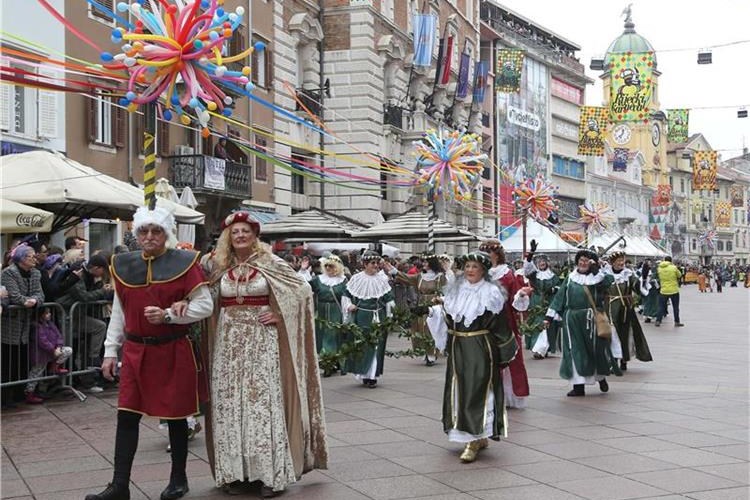- Published: 13.01.2024.
Carnival season starts in northern Croatian coastal region
The carnival season, which will culminate on Mardi Grass, to be observed on 13 February this year, the day before Ash Wednesday (14 February), will be ushered in by first parades of masked merrymakers throughout Croatia's coastal area and in its hinterland on this weekend, 13 and 14 January.
The pre-Lenten carnival season traditionally starts on the first weekend after the holiday of Epiphany, marked on 6 January, and in the the biggest northern coastal city of Rijeka and its surroundings, the carnival season begins on 17 January when the Day of Anthony the Great is observed.Thus, Rijeka and nearby towns and villages begin this season with the sounds of the "Antonjski Rog", that is the sounds of French horns on 17 January, announcing the beginning the season when carnivalists take over the cities and villages.
On 17 January, also the carnival's effigy and official flag will be raised and the carnival effigies will be burnt on Mardi Grass, that is Shrove Tuesday, when Shrovetide culminates.
In the region of Rijeka, Shrovetide is also called "the fifth season".
During the "fifth annual season", revellers choose the queen of Shrovetide in Rijeka, and every weekend there will be joyful and colourful parades passing through the centre of this biggest Croatian seaport.
On the first weekend of the season, children have their masked parade in Rijeka.
On the last weekend of Shrovetide, the grand finale of the carnival season in Rijeka brings together about 10,000 masked revellers from Croatia and abroad.
Rijeka Carnival was restored in 1982 when only three groups of carnival merrymakers walked through the Korzo main street
Shrovetide festivities to start in Crikvenica and other coastal cities this weekend
The coastal city of Crikvenica will start Shrovetide festivities on Saturday, 13 January, and this year's pre-Lenten season, called "Maškare 2024", will run until Shrove Tuesday.
The pre-Lenten carnivals are a tradition maintained for centuries in the coastal parts of Croatia.
The festivities in Crikvenica during the season of Shrovetide attract a few thousand participants in parades as well as a considerable number of foreign and local guests.
Traditional carnival merrymaking in Rijeka hinterland included on UNESCO's Intangible Cultural Heritage List
Bell ringers of Halubje, a village in the hinterland of Rijeka, are well-known for their role in traditional carnival merrymaking, and the annual carnival bell ringers’ pageant in the Kastav region of northwest Croatia is one of several Croatian intangible cultural properties inscribed on UNESCO's Representative List of the Intangible Cultural Heritage of Humanity.
The three-day pageant through the villages of the Kastav region starts on Carnival Sunday and lasts until the Tuesday before Ash Wednesday, when the Pust effigy is burnt.
Although the bell ringers' pageant is connected with ancient rituals of awakening spring and driving away winter and evil spirits, it is still an important part of social life in the Kastav region, according to the Viškovo Tourism Board.
Bell ringers visit about 20 villages a day, stopping in each one for refreshments and socialising with local residents and visitors. In the three days, they tour over 50 villages and hamlets in the region.
They traditionally wear white trousers and striped sailor T-shirts with sheepskin wraps, and on their heads they sport masks in the form of animal heads with horns and red tongues sticking out, which distinguishes them from other bell ringer groups.
The bell ringers of Halubje traditionally participate in the Rijeka Carnival and other carnival pageants.
The House of the Halubje Bell Ringer in Viškovo, northeast of Rijeka, is being constructed to house a permanent museum exhibition and rooms for various events.
The aim of the project is to preserve cultural heritage and promote cultural tourism in this area.
The value of the project is estimated at €5.5 million, and €2.1 million has been secured through a grant. The Ministry of Culture and Media has granted €262,791, while around €1 million has been secured under the "Let's Connect Through Heritage" project. About €700,000 has been approved based on a public call for co-financing EU projects at local and regional level, and Primorje-Gorski Kotar County has allocated €132,000.
(Hina/FaH)
